|
|
|
|
|
|
|
Daily Web Coverage
|
|
|
|
|
|
|
|
|
|
|
Highlights from Thursday, 8 September 2005
On
Thursday, 8 September, Co-Chairs from the
Working Groups presented the reports. In the
afternoon, Co-Chairs Allan Flores and Viveka
Bohn,
presented their Summary of the meeting,
which will be forwarded to CSD-14. The
meeting was adjourned at 4:22 pm.
|
|
|
|
Presentation of reports of the working
groups
The
results and recommendations of each
working group were summarized by the
Co-Chairs and the Secretariat in
non-negotiated reports, which were
presented in Plenary.
|
|
|
| |
|
Working Group 1:
Production Processes and Industrial
Development
WG-I Co-Chair Edwin
Piñero, presented the recommendations of
Working Group I. Recommendations
included: using chambers of commerce to
reach companies; encouraging national
cleaner production centers to focus on
SMEs; including SCP in all levels of
education, notably in business schools;
calculating the costs of inaction;
developing SCP indices; and integrating
SCP into national accounts.
|
| |
-tn.jpg) |
|
WG-I
Co-Chair Edwin Piñero,
Office of the Federal
Environmental Executive, United
States |
|
|
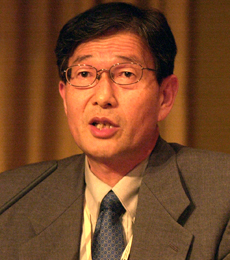 |
WG-II Co-Chair Kazuyoshi
Okazawa, Ministry of the
Environment, Japan
|
|
|
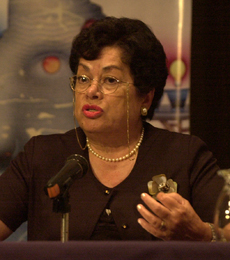 |
WG-II Co-Chair
Cristina Cortinas de Navas,
Mexico
|
|
|
|
| |
|
WORKING GROUP 2: URBAN PLANNING AND
WASTE MANAGEMENT
WG-II
Co-chair Kazuyoshi Okazawa reported on
the group’s discussions and
recommendations, reiterating the
importance of long term urban planning;
public transport, cleaner cars and
non-motorized transport; collection,
disposal and recycling of waste and
problems related to the import of
hazardous wastes; and water charges in
developing countries. He said keys to
success were: leadership, including
appropriate policy and political will;
partnerships with citizens and the
business sector; and public awareness,
including education, awareness raising
and training. He said priorities for
international cooperation focused on:
information, such as awareness raising
and best practices; assistance with,
inter alia, policy formation and
finances; and appropriate and more
efficient technologies.
During the ensuing debate, one
participant, in discussing communication
tools, noted that many people do not
have access to the internet and are
illiterate and that innovative means of
information sharing and communication
need to be developed. Responding to a
query on why small island developing
States (SIDS) had been singled out in a
recommendation referring to technology
assistance, Co-Chair Cortinas explained
that SIDS’ fragile ecosystems, lack of
space for building landfills, and
accumulation of waste from tourism
distinguished them from other countries.
One participant said sanitation had not
been adequately addressed in the working
group. Also raised were issues related
to engaging youth and future decision
makers, risk management, and
difficulties in dividing different types
of waste. |
| |
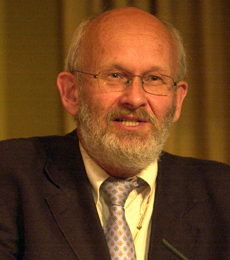 |
WG-III
Co-Chair, Paul Hofseth,
Ministry of the Environment of
Norway
|
|
|
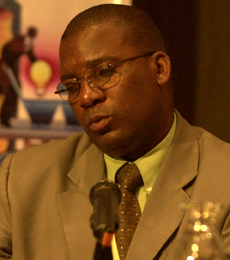 |
WG-III
Co-Chair Kenneth Nkowani,
Zambia
|
|
|
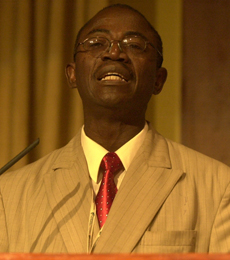 |
|
WG-IV
Co-Chair Philip Acquah,
Environmental Protection Agency,
Ghana |
|
|
| |
|
WORKING GROUP 3: SUSTAINABLE CONSUMPTION
AND PRODUCT DEVELOPMENT
WG-III
Co-Chair Paul Hofseth reported on the
outcomes of the working group’s
deliberations. During the ensuing
discussion, participants suggested
including reference to: levels of
consumption in general; strengthening
regional consumption and production of
goods with short life cycles and high
relative transport costs, such as food;
gender equity and related consumption
patterns; communication and the
challenge of illiteracy; action research
to help tackle sustainable lifestyles;
special needs of SIDS; “challenging”
rather than “changing” minds; increasing
transparency and global standards; and
access to sustainable raw materials.
WORKING GROUP 4: REGIONAL AND NATIONAL
STRATEGIES FOR SCP
WG-IV
Co-Chairs Terence Ilott and Philip
Acquah said SCP strategies could either
be separate from or integrated into
existing sustainable development
strategies. They also highlighted
priority areas for action and the
criteria to identify them, the need to
involve stakeholders in the SCP strategy
development process and
intergovernmental coordination, and
monitoring and indicators. They said the
group further urged communicating SCP in
a language people will understand,
bottom-up strategy development, and
engaging the private sector so that they
come to view SCP as a benefit. Key
recommendations included developing
guidelines to assist governments in
developing national SCP strategies,
continuing cooperation between work on
SCP and development agencies and calling
on UNEP and DESA to facilitate this,
focusing on the costs of inaction, and
working on sustainable procurement,
During the ensuing discussion,
participants suggested using the
experiences from the Mediterranean
Environmental Technical Assistance
Programme to help determine costs of
inaction, and including consumer
organizations when listing stakeholders.
They also highlighted the need for
differentiated strategies at national,
community and municipal levels. |
| |
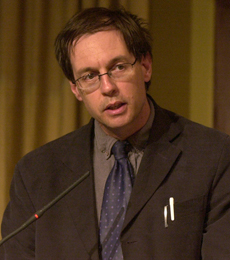 |
WG-IV
Co-Chair Terence Ilott,
Department for Environment, Food
and Rural Affairs (DEFRA),
United Kingdom
|
|
|
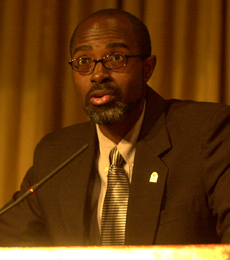 |
|
WG-V Co-Chair David Barrett,
Jamaica, Manager, Energy and
Environment, Petroleum
Corporation of Jamaica |
|
|
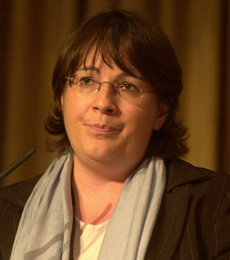 |
|
WG-V
Co-Chair Elfriede-Anna More,
Ministry of Agriculture,
Forestry, Environment and Water
Management, Austria |
|
|
|
| |
|
WORKING GROUP 5: ENERGY, CLIMATE AND AIR
POLLUTION
In
the debate, following the working
group’s presentation in Plenary, WG-V
Co-Chairs David Barrett and Elfriede-Anna
More, explained that transportation
issues were approached from the
perspective of fuel use and air
pollution, in order to avoid overlap
with Working Group 2. One expert
questioned the role of subsidies,
pointing out that subsidies themselves
are one of the biggest barriers for SCP
implementation and another pointed out
that low energy prices can undermine
efforts to change producer and consumer
behavior. It was suggested that
countries should carry out an energy use
and environmental impact review of all
their policies. The Co-Chairs explained
that sustainable procurement should
apply to international organizations.
Experts also underscored the need to
create markets for environmental
services and to focus on lifestyles when
considering energy issues. |
| |
|
|
| |
|
|
| |
|
|
| |
|
|
|
|
|
|
|
 up to top
up to top |
|
Presentation of the draft report by the
Co-Chairs |
|
|
|
Co-Chairs Viveka Bohn and
Allan Flores presented their Draft
Summary of the meeting, which is to be
forwarded to CSD-14 for its
consideration. |
|
|
|
|
|
|
|
The
Summary calls for a third international
expert meeting to be held in 2007 as
part of the Marrakech Process, to work
within and feed into the CSD work
programme. It encourages the work of the
four task forces announced during the
meeting (Sustainable Lifestyles,
Sustainable Products, Cooperation with
Africa, and Sustainable Procurement) and
invites these, and other task forces
which might emerge, to report to the
next meeting and to relevant CSD
sessions. It suggests that the next
meeting should include reports from
future regional meetings on practical
implementation activities at the
regional level. The Summary welcomes the
Marrakech Process website and requests
that UN DESA add a database on
international activities on consumption
and production patterns. It calls for
continuing dialogue with development
agencies, including further cooperation
roundtables at the next meeting, and for
UNEP and UN DESA to lead a review of how
SCP can be better integrated into
development agency projects, with
results presented to the next meeting.
The
Summary concludes that SCP work should
be linked to poverty reduction,
especially the MDGs, and integrated into
national strategies for sustainable
development and poverty reduction. It
calls for further work on estimating the
costs of inaction and the benefits of
SCP; awareness-raising; and ongoing
international cooperation including
capacity building, technical and
financial assistance and knowledge
sharing.
In the ensuing debate,
participants suggested that the Summary
should also reflect the importance of:
civil society organizations’ potential
contribution to SCP, and the need to
strengthen them; research on SCP in
developing countries; information and
communications technology and education;
national action plans; working with and
through the market; local
implementation, including working
towards sustainable cities; linking SCP
to health; changing attitudes and
behavior, rather than just raising
awareness; and the economic and
environmental impacts of
micro-enterprises and SMEs.
|
|
|
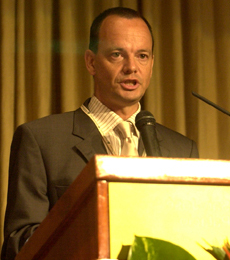 |
Bas de
Leeuw, UNEP
|
|
|
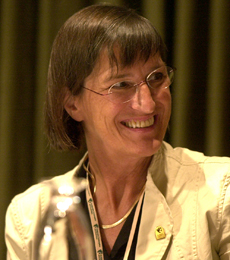 |
|
Viveka Bohn, Ambassador,
Ministry of Sustainable
Development, Sweden |
|
|
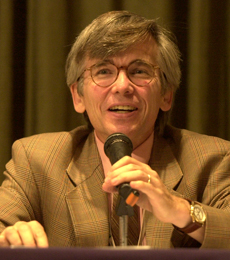 |
David O'Connor, UN DESA
|
|
|
|
|
|
|
Discussion of Future Work and Closing
Remarks
Reviewing highlights of the meeting, Bas
de Leeuw, DTIE, UNEP, noted: inclusion
of new stakeholders in the process;
emphasis on links between SCP and
poverty eradication and the MDGs; the
new cooperation dialogue involving the
development cooperation community; and
progress on the task forces. He said it
was time to move into the implementation
phase, and said future meetings should
build on and not merely replicate what
had taken place at previous meetings. He
said UNEP’s Bali Strategic Plan could
boost SCP through capacity building and
training, stressed that SCP is now
something that developing countries are
also interested in, and said requests
for support could be sent to UNEP. He
said the seeds for a new type of
Marrakech process had been sown.
David
O’Connor, UN DESA, discussed ways in
which DESA would continue to support the
Marrakech Process, including through
policy and other analyses, maintaining
and improving the Marrakech Process
website, updating and building on the
database of international support
activities, and extending it to include
regional activities. He said the
cooperation dialogue had opened a window
into mainstream cooperation work and its
intersection with SCP, and emphasized
that the task forces required commitment
and the opportunity to establish
networks and forge partnerships. He said
the SCP process would feed directly into
the CSD, including through the
Secretary-General’s report. He commended
Costa Rica’s innovations in
environmental and sustainable
development policies.
Reiterating some of the meeting’s
highlights, Co-Chair Viveka Bohn
emphasized links to poverty reduction
and the MDGs, strengthening dialogue and
cooperation with development agencies,
integrating SCP strategies into
sustainable development or poverty
reduction strategies, awareness of costs
of inaction and interest in task forces.
She hoped strategies would be put into
action, and said this meeting would
constitute a valuable contribution to
CSD-14. She emphasized a bottom-up
approach to inspire lifestyle changes,
and on behalf of Sweden, offered to host
the next meeting in 2007.
In his closing
remarks, Co-Chair Allan Flores
underscored how the meeting provided the
opportunity to exchange experiences,
best practices, and information on
current SCP activities. He stressed the
need for more financial support for SCP
projects, and noted how successful the
field trips were in showcasing Costa
Rica’s SCP projects and opportunities.
The meeting was adjourned at 4.22pm.
|
|
|
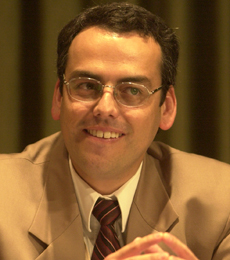 |
|
Allan Flores,
Vice-Minister of Environment and
Energy, Costa Rica |
|
|
|
|
|
|
|
 up to top
up to top |
|
|
|
|
|
|
|
|
|
|
|
|
|
|
|
|

